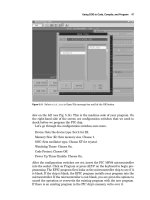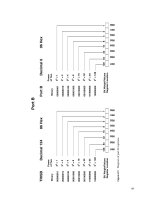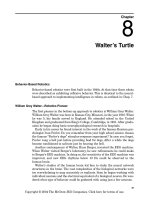McGraw.Hill PIC Robotics A Beginners Guide to Robotics Projects Using the PIC Micro eBook-LiB Part 15 pot
Bạn đang xem bản rút gọn của tài liệu. Xem và tải ngay bản đầy đủ của tài liệu tại đây (92.28 KB, 10 trang )
Color Robotic Vision System 267
Going Further
Obviously, we have just scratched the surface of playing with the CMU camera.
One feature I didn’t have time to implement was an up-and-down tilt servomo-
tor that uses the MMY parameter. This involves adding another servomotor to
the robot, but would allow the robot to follow a target as it moves up and down.
I quickly approached the memory limit of the PIC 16F84. If I had had more
time, I would have implemented it, using another PIC microcontroller with a
little more memory. The PIC 16F628 is port B–compatible with the 16F84 and
has twice as much memory (2048 bytes).
Latest updates and information on the CMU camera can be found at
or .
Parts List
CMU camera
(2) Servomotors (HS-425)
(2) Part A servomotor brackets
16-MHz PIC Experimenter’s Board
(2) Servomotor wheels
PIC 16F84, 20 MHz
16-MHz crystal
(2) 22-pF capacitors
(2) 330-
�,
1
/ -W resistors
4
4.7-k�,
1
/ -W resistor
4
Multidirectional wheel
Aluminum sheet metal, shaft, plastic screws, and nuts
Available from Images SI Inc. (see Suppliers at end of book).
This page intentionally left blank.
Suppliers
Images SI Inc.
109 Woods of Arden Road
Staten Island, NY 10312
(718) 698-8305
(718) 982-6145 (fax)
www.imagesco.com
Jameco Electronics
1355 Shoreway Road
Belmont, CA 94002
(800) 831-4242
(800) 237-6948 (fax)
www.jameco.com
JDR Microdevices
1850 South 10th Street
San Jose, CA 95112
(800) 538-5000
(800) 538-5005 (fax)
www.jdr.com
269
This page intentionally left blank.
Aluminum, 90
Aluminum hip bar, 230
Applics directory, 22
AutoCodeCompletion, 23
Behavior-based (neural) architecture, 83–86
Behavior-based robotics, 86, 87
Berger, Hans, 87
Big-foot walker, 225
Binary, 65–68
Binary counting program, 71–72
Binary number table, 66
Bipedal walker robot, 225–242
assembly, 230–231
feedback, 227
finished product (photographs), 234, 235
footpads, 228–230
movie, 225
parts list, 242
pivoting, 242
possible improvements, 241–242
program, 233–241
schematic, 231–233
servomotor brackets, 228
servomotors, 226, 227
turning right/left, 242
(
See also Hexapod walkers)
Bit, 65
Bookmarks, 24
Braitenberg, Valentine, 125
Braitenberg vehicles, 125–141
bac
k wheels, 129–131
CdS photoresistor cells, 133, 136–137
first vehicle, 128–141
front wheels, 131–132
graphs (transfer functions),
127
neural I/O relationships
, 126
parts list, 141
Index
Braitenberg vehicles (
Cont.):
photograph of finished vehicle, 140
second vehicle (avoidance behavior), 141
sensor array, 137–139
16F84 microcontroller, 139
testing, 139, 141
Breadboard, solderless, 49–50
Brooks, Rodney, 86
Building intelligence, 83–86
button, 72–75
Byte, 65
Camera (see Color robotic vision system)
cd, 16
cd , 17
cd\, 17
CdS photoresistors:
Braitenberg vehicles, 133, 136–137
Walter’s turtle, 109–110
Center punch, 89, 90
CMU camera, 244–245
CodeDesigner, 23–35
connect EPIC programming board to
computer, 33
EPIC programming board software, 33–34
features, 23–24
free version,
24
parts list, 35
set the options, 25–33
software installation, 25
CodeDesigner Lite, 24
Cold rolled steel (CRS),
90
Colored PicBasic syntax, 24
Color robotic vision system, 243–267
CMU camera,
244–245
finished product (photograph),
266
improvements
, 267
incandescent/fluorescent lighting, 254–259
Copyright © 2004 The McGraw-Hill Companies. Click here for terms of use.
271
272 Index
Color robotic vision system (Cont.):
interfacing CMU camera to robot,
250–251
parts list, 267
program 1, 251–254
program 2, 254
program 3, 261–264
robot construction, 264–266
running the program, 266
serial communication, 245–248
servomotor for robot, 259–261
16F84 runs at 16 MHz, 251
VB application program, 248–250
Compiler, 2
installing PicBasic, 11–12
installing PicBasic Pro, 12–18
PicBasic (PicBasic Pro), 2–4
using, 7
Components (see
Parts list)
Connected speech recognition system, 168
Consumables,5
Continuous speech recognition systems, 168
copy, 16
Counting program, 71–72
Creation of intelligence, 83–86
CRS, 90
dir, 16
DOS commands, 16
DOS programming, 37–48
compile, 39–43
EPIC programming board software, 44–48
programming the PIC chip, 43–44
DOS prompt, 17
DOS window, 17
Drill, 90
Edge detection, 243–244
8-bit number, 65
Elmer and Elsie, 88
EPIC Programmer, 3
EPIC Programmer software/hardware, 3
EPIC programming board software, 33–34,
44–48
EPIC programming carrier board,
4,
5
Experimenter’s Board (
see PIC Experimenter’s
Board)
Expert system, 83–86
Finished products (see
Photographs of finished
products; Projects)
Firmware, 5
Flash memory, 5
FlexiForce pressure sensor, 227
Hammer, 90
Hexapod walkers, 143–164
center (tilt) servomotor, 154–155
construction, 148–164
electronics, 158–159
leg positioning, 152–153
linkage, 154, 155
microcontroller program, 159–164
mounting the servomotors, 151–152
moving backward (backward gait), 146–147
moving forward (forward gait), 145–146
parts list, 164
photograph of finished robot, 161
robot base (diagram), 149
robot legs (diagram), 150
sensors, 155–158
servomotors, 144, 145
tripod gait, 143–144
turning left, 147–148
turning right, 148
(See also
Bipedal walker robot)
High-level language, 2
HiTec HS-322HD servomotors, 227
HiTec HS-425BB servomotor, 90–97
HiTec servomotor horn, 189
HM2007 speech recognition integrated circuit, 165
HS-85MG servomotors, 215
HS-322HD servomotors, 227
HS-425BB servomotor, 90–97
Image processing, 243
(
See also Color robotic vision system)
Images SI Inc., 269
“Imitation of Life, An” (Walter), 88
Input, 72, 77–78
input, 77–78
Installation:
CodeDesigner software, 25
EPIC software, 19–22
firmware, 7
PicBasic compiler software, 11–12
PicBasic Pro compiler, 12–18
Intelligence, 83–86
Isolated speech recognition systems
,
168
Jameco Electronics, 269
JDR Microdevices, 269
Label listbox, 24
La
yered behavioral responses, 85–86
LCD display, 54–56, 60–65
Legged walkers, 143
(See also
Bipedal walker robot;
Hexapod
w
alkers)
Index 273
Line error highlighting, 23
Living Brain, The (Walter), 88
Machina Speculatrix, 88
“Machine That Learns, A” (Walter), 88
md, 16
Metalworking tools, 89–90
Microchip Technology Inc., 1, 2
Microcontroller:
defined, 1
features, 1
16F84, 5–6
why used, 1–2
microEngineering Labs, Inc., 2, 4
Models (see Projects)
Neural (behavior-based) architecture, 83–86
Nibbler, 89, 90
Output, 70–71, 77–78
output, 77–78
Parts list, 8–9
bipedal walker robot, 242
Braitenberg vehicle, 141
CodeDesigner, 35
color robotic vision system, 267
hexapod walker, 164
robotic arm, 223–224
speech recognition system, 182–184
testing circuit, 79, 81
Walter’s turtle, 123–124
path, 16
Pavlov, Ivan, 87
Pavlov’s dogs stimulus-response experiment, 87
peek, 75–77
Photographs of finished products:
Braitenberg vehicles, 140
color robotic vision system, 266
hexapod walker, 161
robotic arm, 222, 223
speech recognition system, 179–181
Walter’s robot, 122
PicBasic
,
2
PicBasic compiler
,
2–4
PicBasic Pro compiler, 2–4
PicBasic Pro/PicBasic software
packages/manuals, 3
PIC chips (PICmicro chips), 2
PIC Experimenter’
s Board, 56–65
built-in LCD, 60–65
experiment (prototyping area), 58–60
LCD display, 54–56,
60–65
test circuit (Walter’s turtle), 111
PIC Experimenter’s Board (
Cont.):
use, 56–58
PICmicro chips, 2
PIC programming overview, 2–4
PIC 16F84 circuit, 109
PIC 16F84 microcontroller, 5–6
poke, 70, 71
Port A register, 69
Port B register, 67
Port registers, 65–70
Pressure sensor, 227
Programming carrier board, 4, 5
Programming the PIC chip, 7
Projects:
bipedal walker robot, 225–242
Braitenberg vehicles, 125–141
color robotic vision system, 243–267
finished products (see Photographs of
finished products)
hexapod walker, 143–164
robotic arm, 185–224
speech recognition systems, 165–183
Walter’s turtle, 87–124
(See also
individual subject headings)
QuickSyntaxHelp, 23
Redo/undo, 24
Registers, 65
poke, 70, 71
port, 65–70
port A, 69
port B, 67
TRIS,68
TRISA, 68, 69
TRISB, 67, 68
Robotic arm, 185–224
adding a base, 216–220
assembly multiple-servomotor assemblies,
189–192
finished product (photograph), 222, 223
parts list, 223–224
servomotor brackets, 185–189
servomotor controllers
,
199–215
servomotors
,
197–199, 215
Robotic arm gripper, 193
Robotic arm gripper assembly, 195
Servomotor:
bipedal w
alker robot, 226, 227
centering program/circuit, 78–80
color robotic vision system, 259–261
hexapod walker
,
144,
145
photograph of
,79
274 Index
Servomotor (Cont.):
Testing the PIC microcontroller (Cont.):
robotic arm, 197–199, 215 PIC Experimenter’s Board, 56–65
Walter’s turtle, 90–97 (See also PIC Experimenter’s Board)
what it is, 78 registers (see Registers)
Servomotor bracket kit, 186 schematics of test circuit, 50–53
Servomotor bracket travel, 187 servomotors, 78–79
Servomotor horn, 189 (See also Servomotor)
Shears, 89, 90 solderless breadboard, 49–50
Sheet aluminum, 90 troubleshooting the circuit, 54
Six-legged walker robot, 143–164 Tilden, Mark, 86
(See also Hexapod walkers) Tripod gait, 143–144
16F84 PIC microcontroller, 5–6
TRISA register, 68, 69
Solderless breadboard, 49–50
TRISB register, 67, 68
Speaker-dependent speech recognition system,
TRIS register, 68
167–168 trisx.x, 70
Speaker-independent speech recognition system, 168, Turtle robot (see Walter’s turtle)
172–173
Speech recognition systems, 165–183 Undo/redo, 24
applications, 167
circuit construction, 168–169
Vehicles—Experiments in Synthetic Psychology
clearing trained word memory, 172
(Braitenberg), 125
components, 165–166
Vise, 90
finished product, 179–181
listening/speech understanding, 167
Walker robots (
see Bipedal walker robot; Hexapod
microphone, 181
walkers)
parts list, 182–184
Walter, William Grey, 87–88
programming speech recognition circuit, 177–178
Walter’s turtle, 87–124
16F84 microcontroller program, 176–177
attaching bumper to robot base, 101–103
software approach, 167
behavior, 120–121
speaker-dependent/speaker-independent system,
bumper switch, 104–106
167–168, 172–173
center of gravity, 100–101
speech interface control circuit, 173–176
drive/steering motors, 90
styles of speech, 168
equipment, 89–90
testing recognition, 172
fudge factor, 121
training the circuit, 169–172
handedness, 123
voice security system, 173
light intensity, 121–123
wireless robot control, 181
modes of operation, 88
Speech software, 167
mounting steering servomotor, 107–108
Stainless steel, 90
observed behavior, 88–89
Stand-alone servomotor bracket assembly, 191
parts list, 123–124
Standard-based expert programming, 83–86
photographs of finished product, 122
Statement description, 23
photoresistor, 109–111
Statement Help, 23
power, 119–120
Subdirectory
,
applications
,22
program,
115–119
Suppliers
,
269
sc
hematic
, 114–118
sensor array, 112–114
Testing the PIC microcontroller, 49–81 servomotor, 90–97
accessing ports for output, 70–71 sheet metal fabrication, 97–98
button, 72–75
shell, 99–100
counting program,
71–72
sleep mode
, 119
input, 72
Windows version of EPIC software, 8
input/output commands, 77–78
wink.bas circuit (solderless breadboard), 53
LCD display, 54–56,
60–65
wink.bas program,
45
parts list, 79, 81
peek, 75–77 xcopy
,
16
ABOUT THE AUTHOR
John Iovine is the author of several popular TAB titles that
explore the frontiers of scientific research. He has written
Homemade Holograms: The Complete Guide to Inexpensive,
Do-It-Yourself Holography; Robots, Androids, and
Animatrons: 12 Incredible Projects You Can Build,
considered a cult classic; Kirlian Photography: A Hands-On
Guide; Fantastic Electronics: Build Your Own Negative-
Ion Generator and Other Projects;
and A Step into Virtual
Reality.
Mr. Iovine has also written extensively for Popular
Electronics, Nuts & Volts, Electronics Now, and
other periodicals.
This page intentionally left blank.









